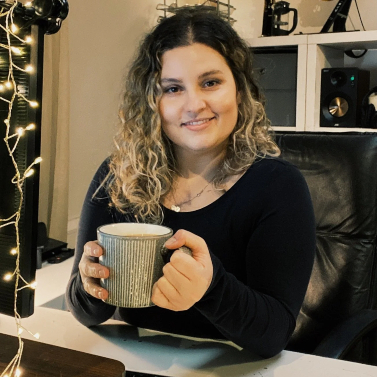If you’re a freelance copywriter, you know the rewards of being able to control your work schedule, but you’ve probably also crossed the line where you feel like it’s controlling you at times. Read on to get tips from fellow freelancers who have walked in your shoes and found ways to balance work and personal life successfully.

Nadia Charif
Table of Contents
Listen to Meditation Podcasts
It's hard to shift from hustling to the off button. It seems counter-intuitive to survival. But as I age, I realize the importance of downtime, as well as connected time and playtime. When I was younger, I was such an energy powerhouse. As I age, I notice that when I don't take these moments each day to balance my energy, I'm not a very fun person to be around. And internally, I notice that I can start resenting all the wonders of life.
So, I intentionally listen to meditation podcasts on the way to meetings. I intentionally take my Powerbeats out on a 10-minute daily walk to nowhere. I fill 30 minutes with something creative that gives me a non-important yet integral purpose, like cooking, coloring, or cultivating a new playlist. I set my daily time blocks to allow for fruitful freelance work at the right times, and daydreaming, creativity and connection with others.
It ain't easy. I heartily lean on the Reminders, Alarm, Notes and Calendar Apps on my Mac devices to schedule downtime.
Designate No-Work Hours
As a freelancer, I work for myself and make my schedule. It can be very hard for me to get some downtime without feeling guilty because I feel like there is always something to be done. So, to address this issue, I have created some “no-work hours” for myself.
During these time slots, I will completely block out everything work-related from my brain. I won't be worried about checking emails, writing drafts, or scanning social media for job opportunities.
These time slots are for me. From Monday to Friday, my “no-work hours” are 1 pm – 2 pm and 6 pm – 8 pm. On the weekends, they are 1 pm – 4 pm. I found that creating these time slots has helped me to stay in control of my work. I'm less likely to feel overwhelmed or panic.

John Vo

Amy De Wolfe
Schedule Downtime in Your Calendar
As a freelancer, a great way to take downtime is to realize the importance of downtime as a business tool for better productivity and plan weekly, monthly, and quarterly events in your calendar.
Every week, this could look like an afternoon of inspiration (visiting a museum, seeing a movie, taking a meditation or fitness class, etc.).
Every month this might be a day completely offline for networking, a family outing, or a day trip to another city.
Every quarter, perhaps a long weekend away. For maximum effectiveness, leave your laptop at home and don’t check your mail until you’re back in the office.
Trust Your Work Ethic
I used to equate the number of hours worked with my best work; however, that is not a solid long-term plan for success as a freelancer. You have to move yourself from ‘new business’ mode, to business owner mode, and an important part of that move is being a good boss and giving yourself time off. It's a mindset switch as much as a physical action.
For me, being flexible with the hours I work is key. If I feel motivated and focused, I’ll let myself work until late into the night, a perk of working for yourself is working when you want.
The flipside of this is when I feel tired or lacking concentration, I take time off. It might be a whole day off, a lie in on a Tuesday morning or just a longer dog walk at lunchtime.
Following popular advice like 5 am morning rituals, 25-minute work sprints and early bedtimes never worked for me. Over time, I learned to trust my work ethic, which, in turn, allowed me to understand the need for time off in (almost) equal measure.

Heloise Rose

Tara Dupuis
Give Yourself One Day Off Every Week
• I often will schedule ‘down time’ into my week by blocking off a few hours in a day and setting an alarm. This is a reminder to me to step away from my computer and do something active and/or non-work-related. I almost always find this helps my focus and productivity when I do sit back down to work.
• I schedule one day a week off so that I can see friends, catch up on hobbies, or just take it easy at home. I am pretty committed to this, even if it means working a few extra hours other days of the week to accommodate the day off. Having one day where I don’t touch work gives a reset to my whole week!
• For scheduling larger breaks or vacations, I reach out to my clients ahead of time, giving them as much notice as possible. I will set my email auto-responder to OOO so it helps manage expectations if clients do send me messages during that time.
Follow A Strict Routine Everyday
There are a few things I do that help me create the time for downtime. I have consistent routines that I do every day. I wake up at the same time. Go to bed at the same time. Exercise at the same time.
During my workday, I try to be as focused and efficient as possible. I have an app on my phone that blocks social media during my workday. I turn my phone on silent, don't check emails, and don't answer phone calls when I am doing focused work.
The other things I do that help me the most are meditation and journaling. I meditate every morning and every afternoon. I stop what I am doing, turn everything off and make 20 minutes for meditation.
I started using an app earlier this year and have found it incredibly helpful. It has challenges that require you to make time for self-care. People don't make it a priority, but having it on my checklist for the day helps.
When you work from home, it's really easy to work through lunch breaks or answer every email no matter what time it is. When my workday is over, I don't reply to emails or calls. This is something I have had to learn. People can wait.

Patty Malowney

Ravi Davda
Go Out and Have Fun
When I first started freelancing, I rarely took any days off. I was young, and let's be honest, arrogant. I didn't think I needed them. I quickly learned that I soon burnt out. I wasn't producing great quality work. I wasn't able to think outside of my business. I was too stuck in the day-to-day.
Now, it's different. Taking downtime is important. You need it; otherwise, you won't produce magic in your business. When I do take downtime, I make sure I get out and do things for myself. I spend money on myself because I'm worth it, and I need to keep on doing it to make myself happy and pursue my business.
Front-load your Tasks
If you want to take some time off, rest, or go out of town, you’ll need cash. So, when I want to take some downtime, I plan ahead. I take on more tasks and finish them as soon as I can. Front-loading assignments can keep your cash flow steady.
You can talk this out with your client. Ask if it’s okay to turn your work in early [and let them know] you will be out for leave.

Sherry Morgan

Taylor Watson
Write it Into Your Planner
Downtime is a must for anyone who is a freelancer. Otherwise, you will experience burnout very quickly. With more people working on a freelance basis, it is important to set rules to protect yourself, both physically and mentally.
We all know that employees benefit from the fact they have holiday entitlements and get paid annual leave, but freelancers do not enjoy the same luxury – if you don’t work, you don’t get paid! A good way to ensure you have downtime is to diarise it, just the way you would plan out your week's work for a client.
Some of the things you can do to ensure you get downtime are:
• Book a weekly exercise class, which means you have to leave your office/home regularly.
• Arrange to meet other ‘work from home/freelancers’ for coffee and a catch-up.
• Take lunchtime leave –go buy your lunch at your favorite shop.
• Schedule as much work as possible – things such as tweets can be planned to automatically update, leaving you a bit of time to relax.
• Don’t feel guilty about taking time off – if work comes you can honestly tell your client that your diary is full and provide them with an alternative date for completion.
• Move money to a separate account regularly and make sure you have a ‘slush fund’ so you can enjoy your time off!
Whatever you do, remember that if you don't schedule in some downtime, you will ultimately pay the price of not being able to work at all. Burnout, fatigue, reduced concentration, poor mental health – all these things can lead to major health issues – YOU are your business so treat yourself with care.
Wrap it up by 5 pm
Trying to find downtime is a serious struggle as a freelancer. I always feel like I can do more. I want to keep writing. I want more clients. I want more money. At the same time, I always seem to have a message on one of my freelancing platforms. I feel like I have to answer right away, or I’m not doing my best.
So how do I force myself to take downtime? Well, sticking to a strict schedule has helped a lot. I make sure that all of my work is done before 5 PM to treat it like a typical workday. Then, after my workday is complete, I can go home and relax and enjoy activities.
While relaxing, I make sure that my laptop is turned off and I have my work email, platforms, etc., set to mute. Otherwise, I will be prone to checking them every so often. (Which, if I’m honest, I do a lot).
Lastly, I try to have goals for downtime every day of the week. For example, I set a certain time of the day where I work out. I dedicate Saturdays to family time where I do no work and just have fun. Every few weeks, I get my hair or nails done. These help to ensure I don’t overdo it.

Christine Wang

Genesis Sampson
Schedule Your Downtime Like It’s an Official Meeting
As a freelancer, it can be easy to end up with meetings and tasks at all hours of the day. To make sure that I still take downtime to live a life outside of my work, I schedule my downtime each week as if it were an official meeting. Depending on the needs of the week, that time may change but once I’ve established when my downtime will be throughout the week, I honor that time as if it were a work event.
When people ask for meetings at that time, I simply say that I am already booked. Additionally, I leave behind any connection to work during those hours so that I am not tempted to sacrifice my time for a quick work task. This strategy has helped me make the most of my time and ensure that I don’t experience burnout.
This is a crowdsourced article. Contributors are not necessarily affiliated with this website and their statements do not necessarily reflect the opinion of this website, other people, businesses, or other contributors.

0 Comments